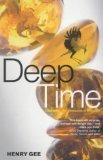 Deep Time: Cladistics, The Revolution in Evolution
Deep Time: Cladistics, The Revolution in Evolution
by Henry Gee
Fourth Estate, ISBN 1857029879
The blurb makes the large claim that Gee “shows us how everything we thought we knew about evolution is wrong.” More trouble for evolutionists? For some, maybe, but this is not about undermining Darwinism. The title refers to the notion that geological time is so unthinkably vast compared with time as we mortals experience it, that it disallows the sort of storytelling that palaeontology has traditionally employed.
The chronological sparseness of fossils is a deeper problem than their geographical rarity. In a fundamental way, it makes it impossible to establish ancestral relationships other than of the broadest kind, yet we are familiar enough with scientific accounts showing how one species descended from another. According to “cladists”, evolutionists have been offering genealogical stories which assume too much about cause and effect.
Enter cladistics, which “looks only at the pattern of the history of life, free from assumptions about the process of the unfolding of history” (p.6). It is assumed, of course, that “evolution has happened; species do transmute into other species” (p.134). The central concept is the “sister-group relationship”, which reflects degrees of cousinhood, rather than assumed lineages.
What difference does this make to the Darwinian in the street? Here’s one consequence of the argument: “It can no longer be claimed that the origin of birds is inextricably linked with the origin of flight” (p.190).
This is definitely worth reading, and Gee paints a vivid picture of the science of fossils. There are also engaging tales of the Gang of Four, the cladist clique at the Natural History Museum, and Gee only once succumbs to the Gleick syndrome of telling us what brand of car he drove when visiting a scientist. Whether cladistics “represents a revolution in thought as profound as that of Darwinian evolution by natural selection” (p.135) is a moot point.
Paul Taylor



